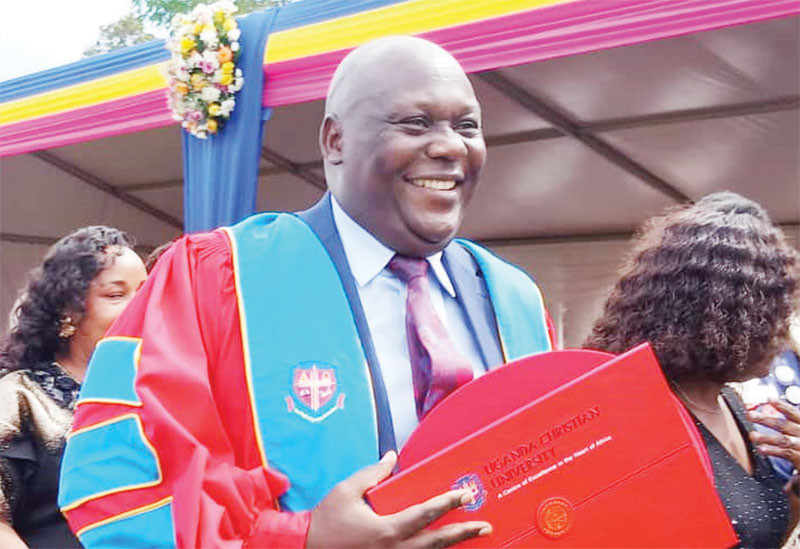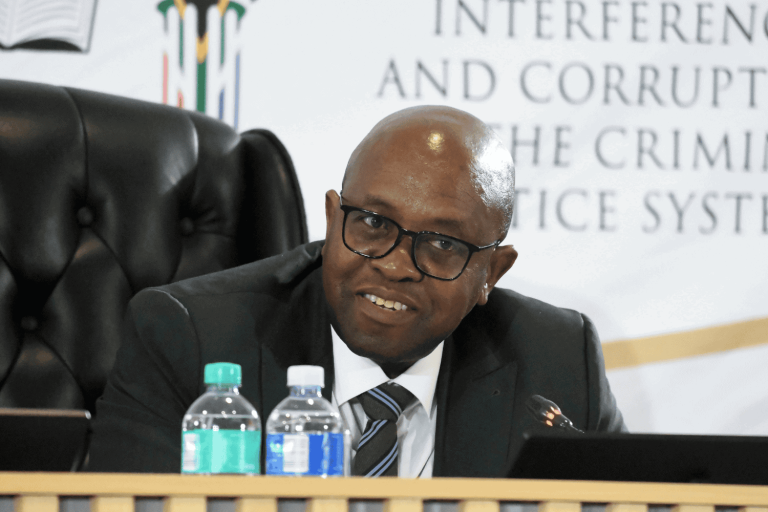
In the education sector, Dr Nantagya Grace Ssebanakitta is best known as the head teacher of Mengo SS.
But on October 24, he formally graduated with a Doctor of Philosophy in Educational Administration and Management from Uganda Christian University (UCU), armed with a groundbreaking study and a clear blueprint to transform e-learning for academic staff in Uganda.
His dissertation, titled “An Analysis of Academic Staff Experiences with E-Learning Uptake in Universal Secondary Education Schools in Central Uganda,” provides a comprehensive and evidence-based roadmap for addressing the critical gaps in technology-mediated teaching.
The study, grounded in various frameworks, employed a mixed-methods approach involving 393 teachers and six headteachers. It revealed that despite teachers’ personal initiatives—using platforms like Zoom, WhatsApp, and Google Classroom—systemic barriers such as unstable electricity, poor internet, insufficient ICT tools, and weak administrative support are severely hindering progress.
A key finding was that institutional readiness is a more reliable predictor of e-learning success than individual teacher motivation. For Dr Nantagya, this research is not merely an academic exercise but a springboard to action.
He plans to leverage his findings to be a catalyst for change in Uganda’s education sector.
“My inspiration to pursue the PhD was the urge to be useful even after I clock the official public service retirement age of 60 years,” Dr Nantagya states.
“I hope to be useful in several learning spaces in applying this knowledge, turning the challenges I identified into opportunities for sustainable growth.”
INSPIRATIONS
According to Dr Nantagya, his commitment to education was forged early in life. He credits his late mother, Violet Buganzi Bugezza, a Grade 2 teacher, for instilling in him the virtue of introspection.
From his late father, Gilbert Bukulu, he learned the discipline of starting his day early, a habit colleagues know well, as he uses the quiet morning hours for self-reflection before engaging with the world. Another profound influence was his late uncle, Amon Mukiibi, a former headteacher at Ngogwe Baskerville SS.
“He taught me the virtue of empathy because he took on very many underprivileged people under his care for education,” Dr Nantagya recalls.
Inspired by this legacy, Dr Natagya has, for the last 17 years supported 10 individuals who are not his relatives through their educational journeys. The path to his doctorate was not without its trials, including the disruptive Covid-19 lockdown and the balancing act of multiple responsibilities at home, in his wider family, and at work.
Through it all, he was guided by the mentorship of Dr Daniel Nkata, his master’s degree supervisor at Uganda Management Institute (UMI).
Reflecting on this guidance, Dr Nantagya said, “Dr Nkata taught me the virtue of being patiently determined. This was invaluable in navigating the challenges of my PhD pursuit.”
When asked about his former student’s achievement, Dr Nkata expressed immense pride.
“Nantagya’s work is a reflection to what patient determination can achieve. His research addresses a critical need in our education system, and his blueprint for improving e-learning is both practical and powerful. He has the unique ability to analyze a complex problem and develop empathetic, actionable solutions.”
With his PhD complete, Dr Nantagya now stands at the forefront of a movement to bridge the digital divide in Uganda’s schools.
By transforming his analytical work into actionable strategies, he aims to ensure that academic staff across the country are equipped, supported, and empowered to deliver quality education in the digital age.
REVOLUTIONIZING E-LEARNING IN UGANDA
Dr Nantagya’s research stands as a milestone because it moves beyond simply identifying that e-learning has problems in Uganda. It provides evidence-based diagnosis of why these problems persist and how they are interconnected, offering a detailed map for navigating toward a solution.
The core of his thesis reveals a system under immense strain.
“I found that while teachers are willing to engage with digital platforms such as Zoom and WhatsApp, their enthusiasm is quickly dampened by overwhelming systemic barriers,” he says.
“I also discovered that institutional readiness proved to be a more reliable predictor of e-learning success than individual teacher motivation. This finding fundamentally shifts the narrative from blaming teachers for being resistant to change toward understanding that the systems themselves are unprepared for change.”
Meanwhile, Dr Nantagya’s research further identified crippling challenges, starting with a basic infrastructural deficit of unstable electricity and poor internet connectivity.
“This was compounded by a severe scarcity of ICT tools, forcing teachers to rely on personal devices, and a critical vacuum in support, where a lack of professional development and weak administrative responsiveness left educators feeling isolated,” he says.
“In the face of these hurdles, teachers showed resilience, creating fragmented coping mechanisms like using their own data and forming informal peer networks.”
Yet, the study concluded that these were merely survival tactics, inadequate for sustainable teaching and leading to widespread burnout and modest satisfaction. The power of this diagnosis comes from its multi-lens analysis, grounded in four powerful theories of learning and technology adoption.
This approach allowed Dr Nantagya to understand that without proper tools and connectivity, teachers cannot create modern learning environments, that the very medium for digital learning is broken, and that the conditions for accepting technology are so weak they override any willingness to adopt it.
This detailed diagnosis now serves as a practical prescription, a clear roadmap for transforming e-learning across Uganda. For policymakers in the Education ministry, the study provides hard data to justify and direct funding.
It argues that investment must first and foremost target the non-negotiable foundation of stable electricity and school-wide internet connectivity. It also informs smarter policy design, ensuring new e-learning strategies are built with these known barriers in mind.
For school leaders and headteachers, the research is both an empowerment and a challenge. It gives them a clear mandate to shift from being managers to becoming active facilitators of e-learning.
This means championing the initiatives, creating structured professional learning communities for teachers to support one another, and finding creative ways to manage resources while advocating for greater support.
For teachers themselves, the thesis serves as a form of validation and a tool for advocacy. It provides them with the empirical evidence to articulate their struggles clearly to administrators and policymakers, moving beyond complaints to data-driven calls for support.
It also promises a future of more relevant, continuous professional development tailored to their real-world challenges. Finally, for development partners and NGOs, Dr Nantagya’s work is a guide for designing effective interventions.
It argues for holistic projects that combine infrastructure, training, and ongoing technical support simultaneously, rather than piecemeal donations of hardware alone. In essence, Dr Nantagya’s PhD provides the crucial “why” behind the “what.”
It transforms the conversation from a general sense that e-learning isn’t working to a precise understanding of the causes, offering Uganda a credible and powerful blueprint for finally realizing the transformative potential of digital education in its schools.



